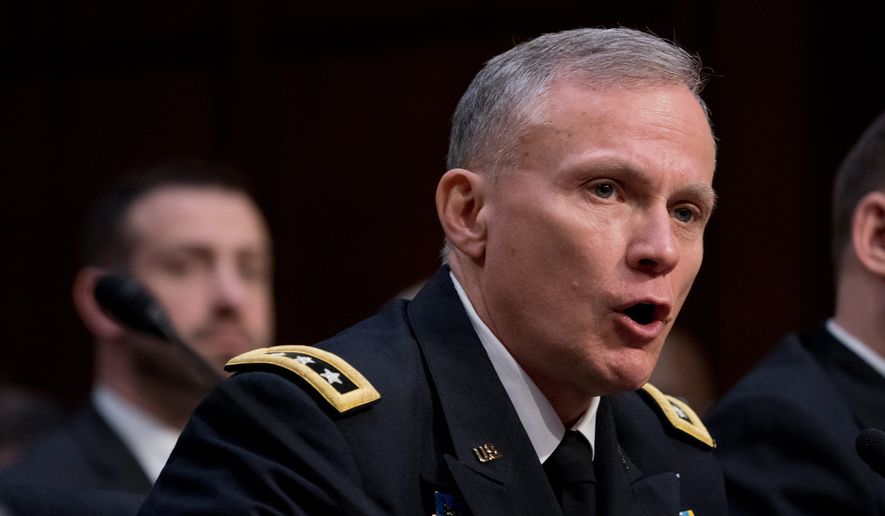China conducted more ballistic missile tests than the rest of the world combined in 2018 and is on pace to double its nuclear arsenal over the coming decade, according to the head of the U.S. Defense Intelligence Agency, who also underscored new threats posed by Russia’s expanding nuclear capabilities in rare public remarks Wednesday.
China and Russia see themselves in a new nuclear and missile competition with each other and the United States, said DIA Director Lt. Gen. Robert P. Ashley Jr. Moscow in particular has abandoned decades of nuclear reduction efforts in favor a fresh stockpile that’s “likely to grow significantly over the next decade,” he added
While Gen. Ashley said U.S. intelligence assesses that Russia has “probably” even violated a key 1996 treaty banning nuclear detonation tests — an assessment some arms control experts disputed Wednesday — he focused the brunt of his remarks on Russian and Chinese development of so-called “non-strategic” nuclear weapons.
The DIA director at a Hudson Institute event focused on so-called “tactical nukes,” weapons designed to be used in battlefield situations or regional ballistic missile targeting.
“Russia is adding new military capabilities to its existing stockpile of non-strategic nuclear weapons including those employed by ships, aircraft and ground forces,” Gen. Ashley said. “These nuclear warheads include theater and tactical-range systems that Russia relies on to deter and defeat NATO or China in a conflict.”
“We assess Russia to have dozens of these systems already deployed or in development.”
The Trump administration is pulling out of the 1987 Intermediate-Range Nuclear Forces (INF) Treaty prohibiting such weapons, citing what it said was persistent Russian cheating. Mr. Trump has talked of bringing China into a new, more comprehensive tactical nuclear accord, something Beijing has fiercely resisted.
China today has only about 250 warheads, compared with the more than 13,000 split between the United States and Russia. But Gen. Ashley said Wednesday that China’s stockpile “will likely at least double” by 2029. Without supplying figures, he said China has outpaced all other countries — including North Korea — in the pace of its missile testing in recent years.
The DIA director said Russia’s development of the shorter-range 9M729 missile, which can be fired from both fixed and mobile launchers, “appears to be purposely designed to disguise the true nature of their testing activity, as well as the true capacity of the missile.”
More broadly, he said Russia is believed to have as many as 2,000 non-strategic nuclear warheads not covered by the Strategic Arms Reduction (START) Treaty, which is set to expire in 2021 unless both sides agree to renew it.
The United States has engaged in its own nuclear weapons modernization program in recent years, but the U.S. military has just one non-strategic nuclear weapons system — the B61 Gravity Bomb — compared to the far more active Russian and Chinese programs, Gen. Ashley said.
Gen. Ashley also said Russia’s recently accelerated development has been “enhanced” by its approach to nuclear testing. “The United States believes that Russia probably is not adhering to the nuclear testing moratorium in a manner consistent with the zero yield standard,” he said.
The DIA director’s remarks drew quick criticism from the Washington-based Arms Control Association, which said he was referencing language in the 1996 Comprehensive Test Ban Treaty (CTBT) that prohibits any nuclear test explosions that produce a self-sustaining, supercritical chain reaction.
“Any violation of the CTBT by Russia, which has signed and ratified the agreement, would be a serious matter,” the group said in a statement. During a question and answer session at Hudson, the DIA director qualified his claim by saying only “that Russia had the ’capability’” for such tests.
The U.S. itself has not ratified the CTBT and critics of the treaty, including National Security Adviser John Bolton, have long claimed it does not adequately define a nuclear test — allowing Moscow and Beijing to violate it.
“But no public evidence has ever been provided to support the claim of illegal Russian testing and Gen. Ashley didn’t provide any Wednesday,” the association said.
• Guy Taylor can be reached at gtaylor@washingtontimes.com.




Please read our comment policy before commenting.